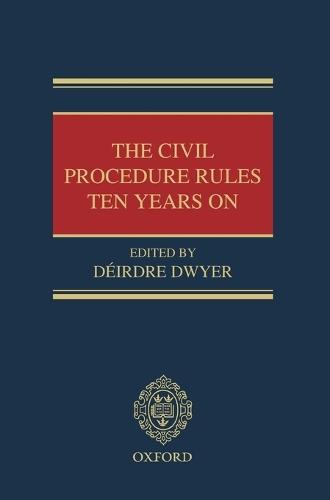Overview
Ten years after the Civil Procedure Rules changed the landscape of civil justice in England and Wales, this book presents an analysis, by some of the leading judges, academics and practitioners involved in civil litigation in this country, of the effectiveness of the Woolf Reforms, and the challenges facing civil procedure today. With a Foreword by Lord Woolf of Barnes, contributors include some of those involved in the Access to Justice inquiry and the implementation of the CPR, as well as critics of the reforms. The book includes sections on the nature of the CPR as 'a new procedural code', case management, costs and funding, civil evidence (including the changes to expert evidence under the CPR), alternative dispute resolution, the influence of the CPR on reforms in civil law jurisdictions and the effect of EC law on English civil procedure, and empirical evidence for the effectiveness of the CPR.
Full Product Details
Author: Déirdre Dwyer (, University of Oxford)
Publisher: Oxford University Press
Imprint: Oxford University Press
Dimensions:
Width: 18.00cm
, Height: 3.20cm
, Length: 25.10cm
Weight: 1.040kg
ISBN: 9780199576883
ISBN 10: 0199576882
Pages: 524
Publication Date: 17 December 2009
Audience:
College/higher education
,
Professional and scholarly
,
Postgraduate, Research & Scholarly
,
Professional & Vocational
Format: Hardback
Publisher's Status: Active
Availability: To order

Stock availability from the supplier is unknown. We will order it for you and ship this item to you once it is received by us.
Reviews
Scholarly, timely and not infrequently controversial, the perspectives offered in CPR Ten Years On are an invaluable contribution to the ongoing debate continually generated by the CPR. No civil practitioner should be without it as we all have our own views of how successful the new landscape has been... Phillip Taylor MBE, Richmond Green Chambers This is a stimulating set of studies by a distinguished group of academics, judges and practitioners. All who participated should be congratulated warmly. The Civil Procedure Rules Ten Years On will be of interest to procedural specialists in this jurisdiction and to the large body of foreign lawyers, whether common law or civilian, interested in our procedural changes and their impact Neil Andrews of Clare College, Cambridge, Civil Justice Quarterly
Author Information
After graduating in Philosophy, Déirdre Dwyer gained a second degree in Law, and was called to the Bar at Lincoln's Inn. Her monograph on The Judicial Assessment of Expert Evidence was published in 2008. Dr Dwyer is a British Academy Postdoctoral Fellow at the University of Oxford Faculty of Law, and a Junior Research Fellow at Pembroke College, Oxford. Her current research interests are in the principles of civil evidence and the origins of modern English civil procedure. She lectures in Evidence and Civil Procedure to graduate students at the University of Oxford. Dr Dwyer serves as the book reviews editor for the International Commentary on Evidence, as a member of the editorial board of the International Journal of Evidence and Proof, and will be one of the editors of the 17th (2010) edition of Phipson on Evidence.



